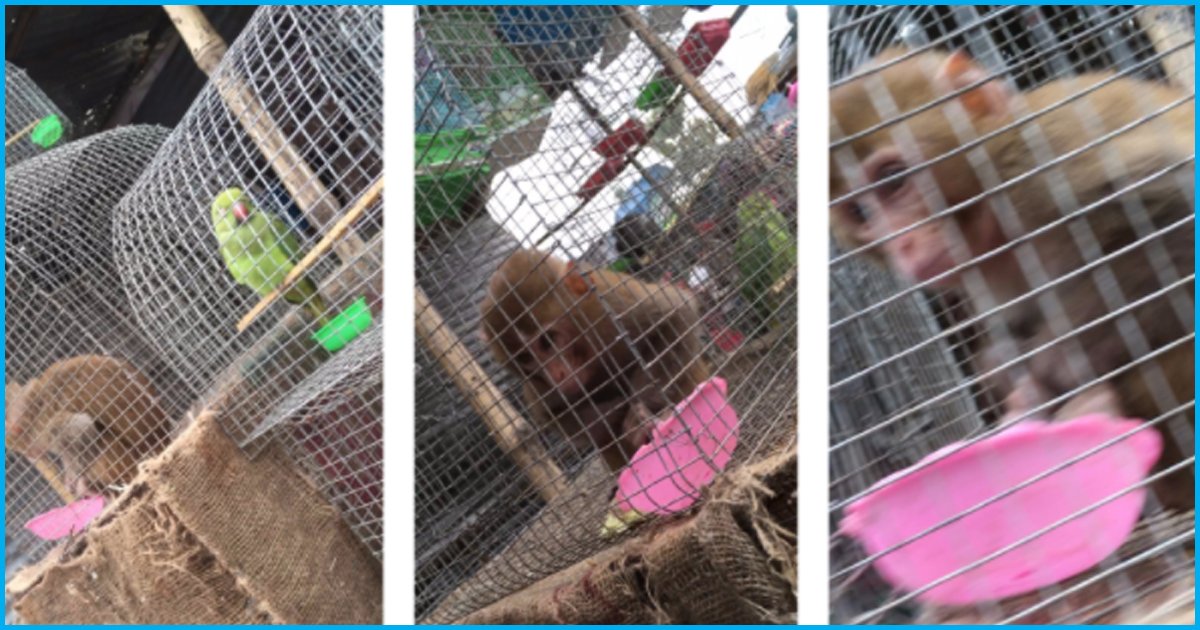
Wildlife And Exotic Birds Sale At Sonepur Fair Finally Stops: How Things Changed Over The Years
How a strong action based-campaign, including litigations in court and collaboration with law officials, ensured no sale of exotic birds and other wildlife at the Sonepur Mela for the first time, ever.
Saran district of the state of Bihar is known for the annual Sonepur Fair that draws in hundreds of thousands of visitors over the course of one month. The fair has been around for more than a century and houses Asia’s largest cattle fair. However, in the last few decades, Sonepur Fair also became a hub for the illegal wildlife trade.
Figure 1: Various species of wild-caught birds kept in cages at the Chidiya Bazaar in 2016. It is illegal to trade in wild birds in India.
Figure 2: Plum headed parakeets and rose ringed parakeets in cages at Chidiya Bazaar in 2016.
In 2016, a research done on behalf of the Animal Welfare Board of India revealed the astonishing level of illegal trade including everything from protected birds and reptiles to mammals were being sold openly in the fair. The ‘elephant’ in the room, however, was the sale of live Asian elephants at the fair. The investigation found that the elephants, mostly calves, were caught illegally from forests of North East India. The traffickers created a fake document trail and sold the young elephants to buyers.
Figure 3: Rose ringed parakeets and rhesus macaque caged in Chidiya Bazaar in 2016.
This was illegal. The Wildlife (Protection) Act of 1972 bans the sale of wildlife in India. Though the illegal sale of wildlife at this fair was common knowledge to everyone, efforts taken to put an end to this issue were isolated and were not leading to success. However, acting against this trade was especially important because Bihar shares a very porous border with Nepal and these animals could thereby reach China, a large market for wildlife.
Figure 4: Rhesus macaques kept in a small cage for sale at Chidiya Bazaar in 2016.
After the 2016 study, Humane Society International/India initiated steps to ensure that the 2017 fair did not involve any illegal sale in exotic birds and other wildlife.
A Sonepur Mela sans illegal wildlife sale
The HSI/India team used the 2016 findings as a base to build a strong campaign to stop the illegal sale of animals in the 2017 Sonepur Mela. The report formed a part of evidence used by HSI/India and People for Animals to further strengthen an existing writ petition in Patna High Court, demanding stringent action against the illegal activities at the fair.
After several hearings in court, the Honourable Patna High Court passed an order instructing the Bihar government to create a task force to protect the interest of animals. Subsequent case proceedings ensured that recommendations were presented asking for an absolute ban on sale and display of any wildlife at the fair amongst other capacity building and awareness related activities to be taken up.
This year, the Sonepur Fair started on the 2nd of November and from the beginning, the HSI/India team was on-site checking on the activities of the fair. Constant conversations with all stakeholders, including District Magistrate of Saran, Mr. Harihar Prasad, ensured a check was kept on the illegal sale of any wildlife species which resulted in absolutely no sale or display of wildlife, including exotic birds.
Figure 5: Posters warning people about the illegality of sale and purchase of wild animals at the fair in 2017.
Furthermore, HSI/India efforts bore more fruit when our team witnessed that the infamous Chidiya Bazaar was completely shut due to the strict police vigilance and the fear of action against defaulters. In fact, a police camp was set up close to the shut Chidiya Bazaar to ensure that the situation remained calm and positive during the month-long event.
Figure 6: The entrance of Chidiya Bazaar, bolted shut in 2017.
Figure 7: The police camp situated near the Chidiya Bazaar in 2017.
This is a victory for the animals and has made a dent in the illegal wildlife trade market. The fact that signboards with directions to Chidiya Bazaar were painted black is a landmark step in the end of the illegal animal sale that happens at Sonepur and a positive reinforcement of the fact that when animal protectors and the law enforcers come together, illegal traders can finally feel the heat of the law. Moving forward, HSI/India will ensure that the enforcement agencies pursue strict vigilance in the coming years, by making frequent visits to the fair and communicating with the task force. It is imperative that the people involved in the enforcement of the court directive aren’t deterred about this in the future and continue doing the great work they did this year.
Figure 8: The direction signs with the word Chidiya painted black in 2017.
A Humane Society International – India intervention story
 All section
All section





















